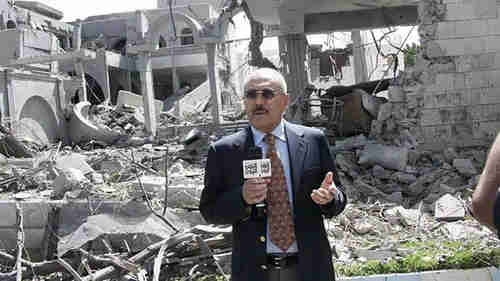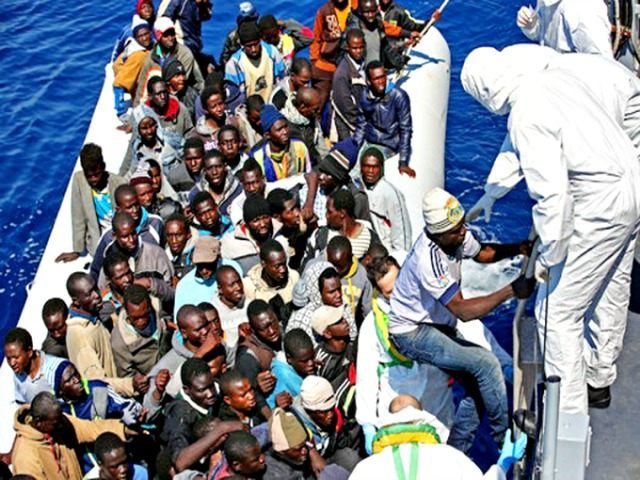This morning’s key headlines from GenerationalDynamics.com
- Saudis and Houthis escalate Yemen war further, prior to ‘ceasefire’
- EU seeks approval of military action in Libya against migrant traffickers
Saudis and Houthis escalate Yemen war further, prior to ‘ceasefire’

Former Yemen president Ali Abdullah Saleh addresses the nation from the ruins of his home. (Reuters)
The Yemen war is supposed to stop on Tuesday, with both the Saudis and the Iran-backed Houthis observing a 5-day “ceasefire” that will then be renewed indefinitely. So the war escalations that occurred on Monday might be interpreted as (A) each side getting as much done before the ceasefire, or (B) each side having no intention to honor the ceasefire. We should know soon.
The Houthis stepped up their intense artillery and rocket attacks across the border into villages on Saudi Arabia soil. The Saudis consider this to be crossing a “red line.”
Two foreign workers from Bangladesh were killed by Houthi artillery in the border city of Najran last week. This is a major humiliation to the Saudis. More than 500 Bangladeshis working in Yemen have returned home in the last month, but those working in Saudi Arabia have remained so far.
The Houthis are also bragging about having shot down a Moroccan warplane which is part of the Saudi coalition.
The Saudis have intensified their airstrikes in Sanaa, the capital city of Yemen, and in particular they targeted the home of Yemen’s former president Ali Abdullah Saleh, leaving it in ruins. For months, it has been suspected that Saleh was supporting the Houthis, though he has denied it. But after the bombing, Saleh made it official:
I was not an ally of Ansar Allah [the Houthis] but today I am announcing from this place that Yemenis will be supportive of anyone who defends the nation’s resources.
Few people believe that there will be a ceasefire on Tuesday, but even if there is, even fewer people believe that the ceasefire will hold for long. Daily Star (Dhaka) and Gulf News (Dubai) and Al Arabiya (Riyadh)
EU seeks approval of military action in Libya against migrant traffickers
The European Union, facing a rising tide of migrants, asked the United Nations on Monday to authorize military action to destroy boats used to smuggle people from Libya to Europe.
Federica Mogherini, the EU’s foreign policy chief, told the UN Security Council on Monday that the problem of migrants illegally crossing the Mediterranean from Libya to Europe was major and growing crisis that threatened Europe as well as the migrants themselves.
Saving lives on one side and dismantling the criminal organizations that are organizing smuggling and trafficking — the two things have to go hand in hand…
It is not only a humanitarian emergency, but also a security crisis, since smuggling networks are linked to, and in some cases finance, terrorist activities, which contributes to instability in a region that is already unstable enough.
The proposal is to destroy the smugglers’ “business model.” EU forces would board smugglers’ boats in Libyan waters, after they’ve left the Libyan port, remove the migrants, and remove the boat from service. With fewer boats available for smuggling, the flow of migrants would be reduced.
There are a number of problems with this proposal:
- Libya is in chaos, since the 2011 military action that ended Muammar Gaddafi. Now there are two competing governments in Libya, one in the east and one in the west, and both of these governments oppose the proposal.
- What would be done with the boats? Russia is opposed to simply destroying them.
- What would be done with the migrants removed from the boats? The EU is guaranteeing that they would not be sent back to their home countries, which would be a violation of international law. Separately, EU officials in Brussels are discussing a quota system that would require each EU country to accept a certain minimum number of migrants. Italy, Greece and Malta favor a quota system, since they have been bearing the brunt of the migrant crisis. But other countries, including Britain and Hungary, are opposed.
- How do you tell the difference between a smuggler’s boat and a fishing boat?
The major objection to the plan is that it would not solve the core problem. Most of the migrants are coming to escape brutal conditions in Syria, Eritrea, or other countries. There are reportedly tens of thousands of migrants already in Libya, queuing up to be on a migrant boat, and there are probably tens of thousands more “in the pipeline,” en route from their home countries. Even if all the boats could be taken out of service, the result might be a mob situation in Libya.
Also, traffickers get paid something like $2-5,000 per migrant. A rubber dinghy containing 150 migrants is worth hundreds of thousands of dollars to the traffickers. So even if the military proposal worked, the most likely outcome would be a hundreds of new boat-building businesses and rubber dinghy-importing businesses in Libya. The traffickers would find a way to keep their lucrative business going. Irish Times and Full text of draft EU migration plan (PDF) and CNN
KEYS: Generational Dynamics, Yemen, Saudi Arabia, Houthis, Sanaa, Ali Abdullah Saleh, Iran, Najran, Bangladesh, Morocco, European Union, Libya, Federica Mogherini
Permanent web link to this article
Receive daily World View columns by e-mail

COMMENTS
Please let us know if you're having issues with commenting.